09届高三年级英语第一次阶段测试
- 格式:doc
- 大小:207.00 KB
- 文档页数:15
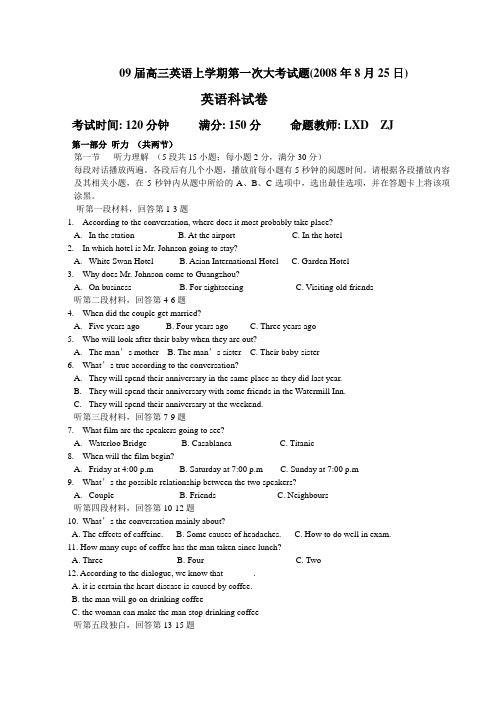
09届高三英语上学期第一次大考试题(2008年8月25日)英语科试卷考试时间: 120分钟满分: 150分命题教师: LXD ZJ第一部分听力(共两节)第一节听力理解(5段共15小题;每小题2分,满分30分)每段对话播放两遍。
各段后有几个小题,播放前每小题有5秒钟的阅题时间。
请根据各段播放内容及其相关小题,在5秒钟内从题中所给的A、B、C选项中,选出最佳选项,并在答题卡上将该项涂黑。
听第一段材料,回答第1-3题1.According to the conversation, where does it most probably take place?A.In the stationB. At the airportC. In the hotel2.In which hotel is Mr. Johnson going to stay?A.White Swan HotelB. Asian International HotelC. Garden Hotel3.Why does Mr. Johnson come to Guangzhou?A.On businessB. For sightseeingC. Visiting old friends听第二段材料,回答第4-6题4.When did the couple get married?A.Five years agoB. Four years agoC. Three years ago5.Who will look after their baby when they are out?A.The man’s motherB. The man’s sisterC. Their baby-sister6.What’s true according to the conversation?A.They will spend their anniversary in the same place as they did last year.B.They will spend their anniversary with some friends in the Watermill Inn.C.They will spend their anniversary at the weekend.听第三段材料,回答第7-9题7.What film are the speakers going to see?A.Waterloo BridgeB. CasablancaC. Titanic8.When will the film begin?A.Friday at 4:00 p.mB. Saturday at 7:00 p.mC. Sunday at 7:00 p.m9.What’s the possible relationship between the two speakers?A.CoupleB. FriendsC. Neighbours听第四段材料,回答第10-12题10.What’s the conversation mainly about?A. The effects of caffeine.B. Some causes of headaches.C. How to do well in exam.11. How many cups of coffee has the man taken since lunch?A. ThreeB. FourC. Two12. According to the dialogue, we know that ______ .A. it is certain the heart disease is caused by coffee.B. the man will go on drinking coffeeC. the woman can make the man stop drinking coffee听第五段独白,回答第13-15题13. What is mustard?A. A new foodB. A food since ancient timesC. Only a French food14. Besides being used as a food, what can mustard be used as, especially in the past?A. MedicineB. DecorationC. Glue (胶水)15. What gives mustard its bright color?A. SaltB. VinegarC. Spices第二节听取信息听下面一段独白,请根据题目要求,从所听到的内容中获取必要的信息,填入标号为16~20的空格中。
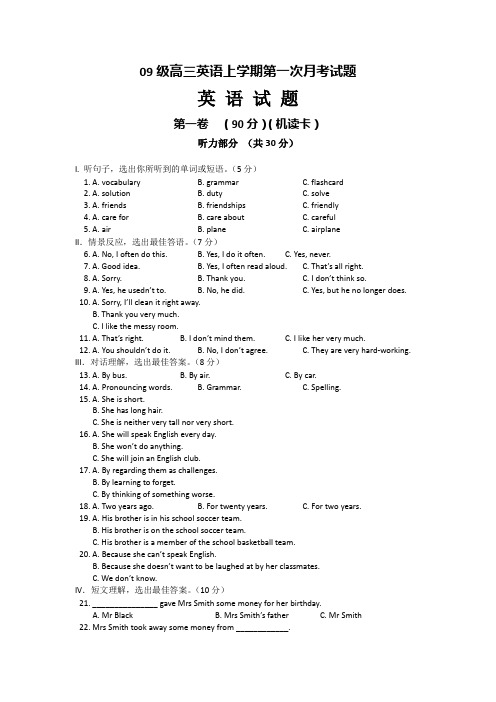
09级高三英语上学期第一次月考试题英语试题第一卷(90分)(机读卡)听力部分(共30分)I. 听句子,选出你所听到的单词或短语。
(5分)1. A. vocabulary B. grammar C. flashcard2. A. solution B. duty C. solve3. A. friends B. friendships C. friendly4. A. care for B. care about C. careful5. A. air B. plane C. airplaneII.情景反应,选出最佳答语。
(7分)6. A. No, I often do this. B. Yes, I do it often. C. Yes, never.7. A. Good idea. B. Yes, I often read aloud. C. That’s all right.8. A. Sorry. B. Thank you. C. I don’t think so.9. A. Yes, he usedn’t to. B. No, he did. C. Yes, but he no longer does.10. A. Sorry, I’ll clean it right away.B. Thank you very much.C. I like the messy room.11. A. That’s right. B. I don’t mind them. C. I like her very much.12. A. You shouldn’t do it. B. No, I don’t agree. C. They are very hard-working. III.对话理解,选出最佳答案。
(8分)13. A. By bus. B. By air. C. By car.14. A. Pronouncing words. B. Grammar. C. Spelling.15. A. She is short.B. She has long hair.C. She is neither very tall nor very short.16. A. She will speak English every day.B. She won’t do anything.C. She will join an English club.17. A. By regarding them as challenges.B. By learning to forget.C. By thinking of something worse.18. A. Two years ago. B. For twenty years. C. For two years.19. A. His brother is in his school soccer team.B. His brother is on the school soccer team.C. His brother is a member of the school basketball team.20. A. Because she can’t speak English.B. Because she doesn’t want to be laughed at by her classmates.C. We don’t know.IV.短文理解,选出最佳答案。
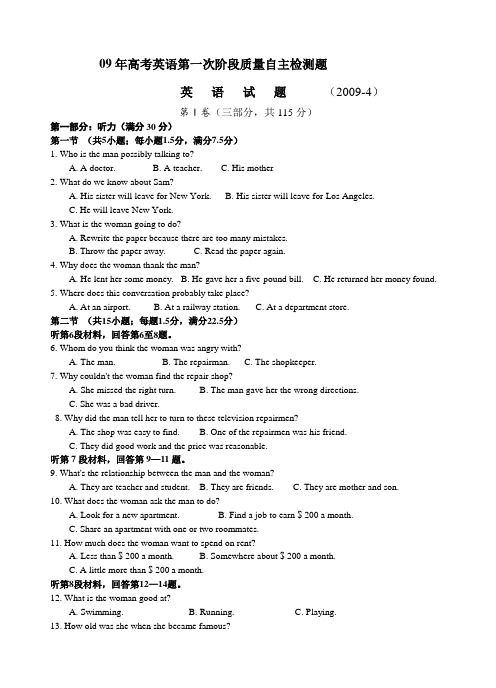
09年高考英语第一次阶段质量自主检测题英语试题(2009-4)第I卷(三部分,共115分)第一部分:听力(满分30分)第一节(共5小题;每小题1.5分,满分7.5分)1. Who is the man possibly talking to?A. A doctor.B. A teacher.C. His mother2. What do we know about Sam?A. His sister will leave for New York.B. His sister will leave for Los Angeles.C. He will leave New York.3. What is the woman going to do?A. Rewrite the paper because there are too many mistakes.B. Throw the paper away.C. Read the paper again.4. Why does the woman thank the man?A. He lent her some money.B. He gave her a five-pound bill.C. He returned her money found.5. Where does this conversation probably take place?A. At an airport.B. At a railway station.C. At a department store.第二节(共15小题;每题1.5分,满分22.5分)听第6段材料,回答第6至8题。
6. Whom do you think the woman was angry with?A. The man.B. The repairman.C. The shopkeeper.7. Why couldn't the woman find the repair shop?A. She missed the right turn.B. The man gave her the wrong directions.C. She was a bad driver.8. Why did the man tell her to turn to these television repairmen?A. The shop was easy to find.B. One of the repairmen was his friend.C. They did good work and the price was reasonable.听第7段材料,回答第9—11题。
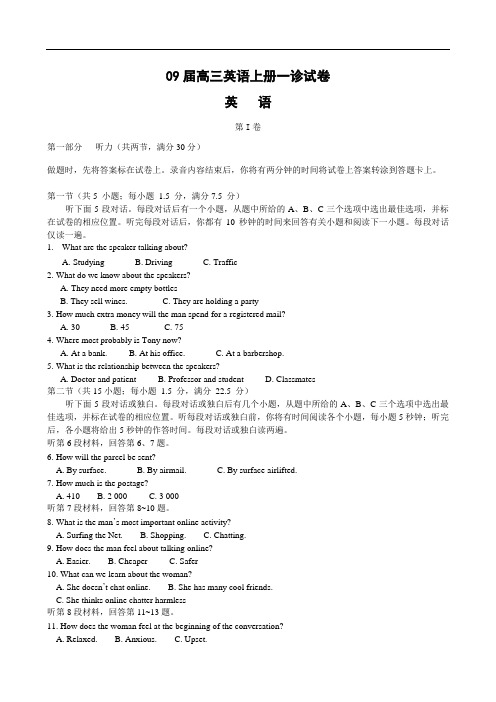
09届高三英语上册一诊试卷英语第I卷第一部分听力(共两节,满分30分)做题时,先将答案标在试卷上。
录音内容结束后,你将有两分钟的时间将试卷上答案转涂到答题卡上。
第一节(共5 小题;每小题 1.5 分,满分7.5 分)听下面5段对话。
每段对话后有一个小题,从题中所给的A、B、C三个选项中选出最佳选项,并标在试卷的相应位置。
听完每段对话后,你都有10秒钟的时间来回答有关小题和阅读下一小题。
每段对话仅读一遍。
1.What are the speaker talking about?A. StudyingB. DrivingC. Traffic2. What do we know about the speakers?A. They need more empty bottlesB. They sell wines.C. They are holding a party3. How much extra money will the man spend for a registered mail?A. 30B. 45C. 754. Where most probably is Tony now?A. At a bank.B. At his office.C. At a barbershop.5. What is the relationship between the speakers?A. Doctor and patientB. Professor and student D. Classmates第二节(共15小题;每小题 1.5 分,满分22.5 分)听下面5段对话或独白。
每段对话或独白后有几个小题,从题中所给的A、B、C三个选项中选出最佳选项,并标在试卷的相应位置。
听每段对话或独白前,你将有时间阅读各个小题,每小题5秒钟;听完后,各小题将给出5秒钟的作答时间。
每段对话或独白读两遍。
听第6段材料,回答第6、7题。
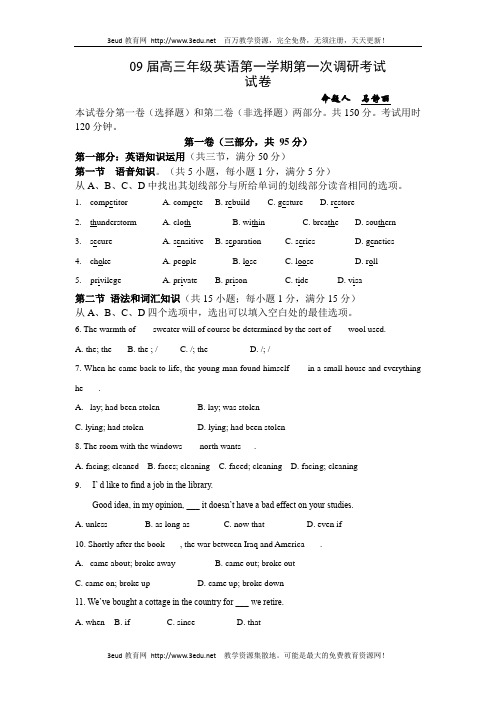
09届高三年级英语第一学期第一次调研考试试卷命题人马静丽本试卷分第一卷(选择题)和第二卷(非选择题)两部分。
共150分。
考试用时120分钟。
第一卷(三部分,共 95分)第一部分:英语知识运用(共三节,满分50分)第一节语音知识。
(共5小题,每小题1分,满分5分)从A、B、C、D中找出其划线部分与所给单词的划线部分读音相同的选项。
petitor A. compete B. rebuild C. gesture D. restore2.thunderstorm A. cloth B. within C. breathe D. southern3.secure A. sensitive B. separation C. series D. genetics4.choke A. people B. lose C. loose D. roll5. privilege A. private B. prison C. tide D. visa第二节语法和词汇知识(共15小题;每小题1分,满分15分)从A、B、C、D四个选项中,选出可以填入空白处的最佳选项。
6. The warmth of ___ sweater will of course be determined by the sort of ___ wool used.A. the; theB. the ; /C. /; theD. /; /7. When he came back to life, the young man found himself ___ in a small house and everything he ___.y; had been stolenB. lay; was stolenC. lying; had stolenD. lying; had been stolen8. The room with the windows ___ north wants___.A. facing; cleanedB. faces; cleaningC. faced; cleaningD. facing; cleaning9. ---I’ d like to find a job in the library.---Good idea, in my opinion, ___ it doesn’t have a bad effect on your studies.A. unlessB. as long asC. now thatD. even if10. Shortly after the book ___, the war between Iraq and America ___.A.came about; broke awayB. came out; broke outC. came on; broke upD. came up; broke down11. We’ve bought a cottage in the country for ___ we retire.A. whenB. ifC. sinceD. that12. I’m looking for a new job, one ___ I can ge t a bit more job satisfaction.A. whenB. whereC. thatD. which13. We must do something to ___ the air ___ seriously.A.stop; pollutingB. keep; from being pollutedC. prevent; from pollutingD. keep; polluting14. ___ the sake of your fat her, I’ll help you out of trouble.A. ToB. OfC. ForD. At15. Mr. Wang was chosen to ____ our school at the meeting.A. representB. stand forC. instead ofD. take the place of16. Only under special circumstances ____ to take those tests.A.are freshmen permittedB. freshmen are permittedC. permitted are freshmenD. are permitted freshmen17.Americans eat ____ vegetables per person today as they did in 1910.A.more than twiceB. as twice as manyC. twice as many asD. more than twice as many18.Betty has chosen Spanish ____ her second foreign language ____ I have chosen German.A. as; asB. as; whileC. like; butD. for; when19.Hurry! The train ___. You know it ____ at 8:30 a.m.A.leaves; leavesB. is leaving; leavesC. leaves; is leavingD. is leaving; leaving20.If most breadwinners ____ a day’s pay to the Hope Project, then it will be hopeful.A. leaveB. presentC. donateD. give第三节:完形填空(共20小题;每小题1.5分,满分30分)阅读下面短文,掌握其大意,然后从各题所给的四个选项(A、B、C和D)中,选出最佳选项。
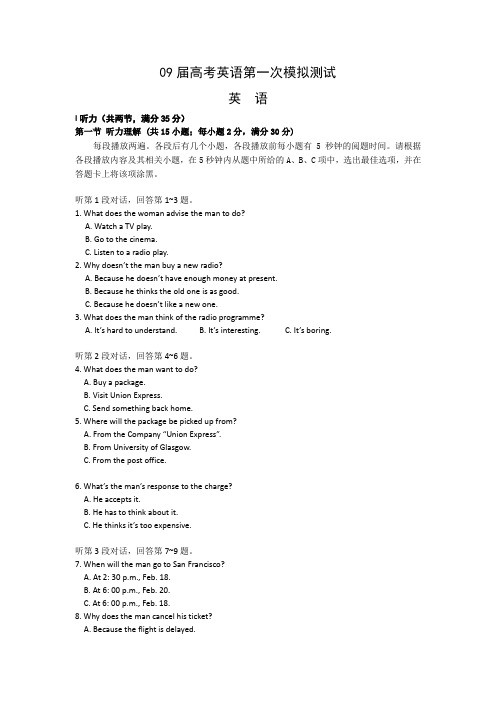
09届高考英语第一次模拟测试英语I听力(共两节,满分35分)第一节听力理解 (共15小题;每小题2分,满分30分)每段播放两遍。
各段后有几个小题,各段播放前每小题有5秒钟的阅题时间。
请根据各段播放内容及其相关小题,在5秒钟内从题中所给的A、B、C项中,选出最佳选项,并在答题卡上将该项涂黑。
听第1段对话,回答第1~3题。
1. What does the woman advise the man to do?A. Watch a TV play.B. Go to the cinema.C. Listen to a radio play.2. Why doesn’t the man buy a new radio?A. Because he doesn’t have enough money at present.B. Because he thinks the old one is as good.C. Because he doesn’t like a new one.3. What does the man think of the radio programme?A. It’s hard to understand.B. It’s interesting.C. It’s boring.听第2段对话,回答第4~6题。
4. What does the man want to do?A. Buy a package.B. Visit Union Express.C. Send something back home.5. Where will the package be picked up from?A. From the Company “Union Express”.B. From University of Glasgow.C. From the post office.6. What’s the man’s response to the charge?A. He accepts it.B. He has to think about it.C. He thinks it’s too expensive.听第3段对话,回答第7~9题。
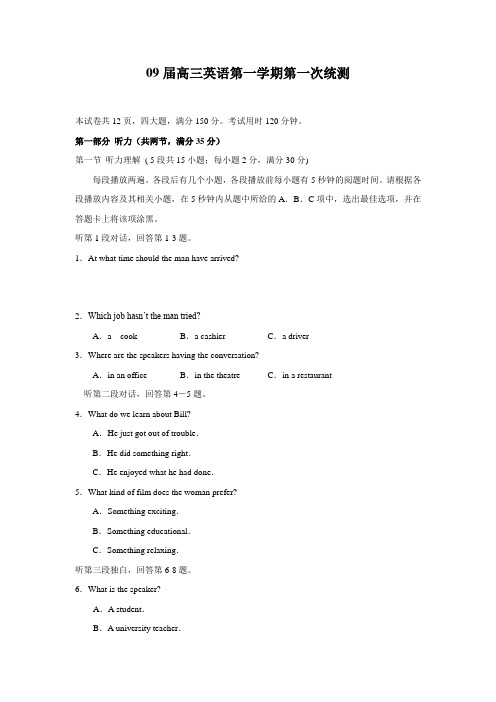
09届高三英语第一学期第一次统测本试卷共12页,四大题,满分150分。
考试用时120分钟。
第一部分听力(共两节,满分35分)第一节听力理解( 5段共15小题;每小题2分,满分30分)每段播放两遍。
各段后有几个小题,各段播放前每小题有5秒钟的阅题时间。
请根据各段播放内容及其相关小题,在5秒钟内从题中所给的A.B.C项中,选出最佳选项,并在答题卡上将该项涂黑。
听第1段对话,回答第1-3题。
1.At what time should the man have arrived?2.Which job hasn’t the man tried?A.a cook B.a cashier C.a driver3.Where are the speakers having the conversation?A.in an office B.in the theatre C.in a restaurant听第二段对话,回答第4-5题。
4.What do we learn about Bill?A.He just got out of trouble.B.He did something right.C.He enjoyed what he had done.5.What kind of film does the woman prefer?A.Something exciting.B.Something educational.C.Something relaxing.听第三段独白,回答第6-8题。
6.What is the speaker?A.A student.B.A university teacher.C.A tourist guide.7.What does the speaker mainly talk about?A.Services offered by the Student Center.B.Important locations on campus.C.The university enrollment.8.According to the speaker, what is the main purpose of the Student Centre?A.To help students with their enrollment.B.To provide help and leisure activities.C.To provide textbooks for university courses.听第四段对话,回答第9-11小题。
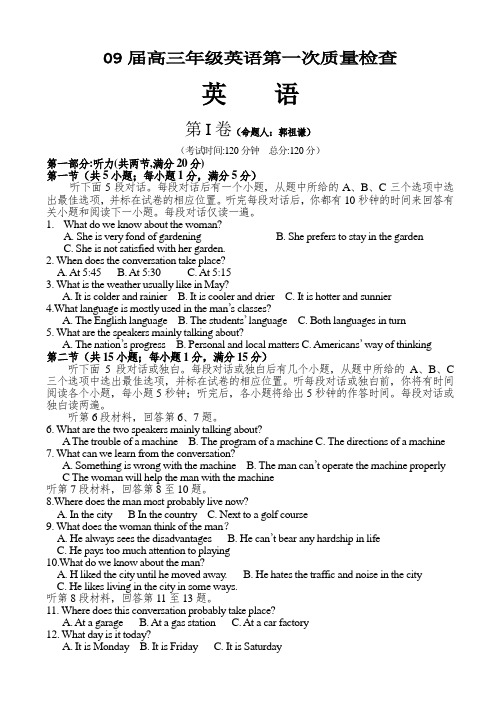
09届高三年级英语第一次质量检查英语第I卷(命题人:郭祖谦)(考试时间:120分钟总分:120分)第一部分:听力(共两节,满分20分)第一节(共5小题;每小题1分,满分5分)听下面5段对话。
每段对话后有一个小题,从题中所给的A、B、C三个选项中选出最佳选项,并标在试卷的相应位置。
听完每段对话后,你都有10秒钟的时间来回答有关小题和阅读下一小题。
每段对话仅读一遍。
1.What do we know about the woman?A. She is very fond of gardeningB. She prefers to stay in the gardenC. She is not satisfied with her garden.2. When does the conversation take place?A. At 5:45B. At 5:30C. At 5:153. What is the weather usually like in May?A. It is colder and rainierB. It is cooler and drierC. It is hotter and sunnier4.What language is mostly used in the man’s classes?A. The English languageB. The students’ languageC. Both languages in turn5. What are the speakers mainly talking about?A. The nation’s progressB. Personal and local mattersC. Americans’ way of thinking第二节(共15小题;每小题1分,满分15分)听下面5段对话或独白。
每段对话或独白后有几个小题,从题中所给的A、B、C 三个选项中选出最佳选项,并标在试卷的相应位置。

通州市2009届高三第一次调研测试英语试卷(考试时间:120分钟满分120分)第I卷(三部分共85分)第一部分听力(共两节,满分20分)做题时,先将答案标在试卷上。
录音内容结束后,你将有两分钟的时间将试卷上答案转涂到答题卡上。
第一节(共5小题;每小题1分,满分5分)听下面5段对话。
每段对话后有一个小题,从题中所给的A、B、C三个选项中选出最佳选项,并标在试卷的相应位置。
听完每段对话后,你都有10秒钟的时间来回答有关小题和阅读下一小题。
每段对话仅读一遍。
1. What is the weather like?A. It is raining.B. It’s cloudy.C. It’s sunny.2. Who will go to China next month?A. Lucy.B. Alice.C. Richard.3. What are the speaker talking about?A.The man’s sister.B. A film.C. An actor.4. Where will the speakers meet?A. In Room 340.B. In Room 314.C. In Room 223.5. Where does the conversation most probably take place?A. In a restaurant.B. In an office.C. At home.第二节(共15小题;每题1分,满分15分)听下面5段对话或独白。
每段对话或独白后有几个小题,从题中所给的A、B、C三个选项中选出最佳选项,并标在试卷的相应位置。
听每段对话或独白前,你将有时间阅读各个小题,每小题5秒钟;听完后,每小题将给出5秒钟的作答时间。
每段对话或独白读两遍。
听第6段材料,回答第6至8题。
6. Why did the woman go to New York?A. To spend some time with the baby.B. To look after her sisterC. To find a new job.7. How old was the baby when the woman left New York?A. Two months.B. Five months.C. Seven months.8. What did the woman like doing most with the baby?A. Holding him.B. Playing with him.C. Feeding him. 听第7段材料,回答第9至11题。

09届高三第一次模拟考试英语试题考试时间110分钟满分150分命题人:张玲姜义国第I卷(客观题,将正确答案涂在答题卡对应题号位置)第一节:单项填空(共15小题每题1分共15分)1.Try to spend your time just on the things you find_________.A. worthing doing themB. worth being doneC. worthy to being doneD. worthy of being done2.Although the used car seems in good ____________,it cannot run too fast.A.stateB.situationC.conditionD.occasion3.The volcano erupted violently ,yet the village at the foot of it should _________.e throughB.go throughC.get throughD.pass through4. Don’t worry too much about making ___ mistakes. They are ___ natural part of learning.A. /: aB. the;/C. /; theD. the; the5.Jack went to college last year and left his parents ,____________ to return home until he achieves his goal.A.determining notB.not determinedC.not determiningD.determined not6. The voyages of travellers before the 17th century show that they were not ________ the sea even though theydidn’t have modern navigational aids.A. at the expense ofB. at the risk ofC. in the way ofD. at the mercy of7. You’ll _______ the department until the end of the year. Next year you will be rearranged.A. be attached toB. be belonged toC. owe toD. be addicted to8.The man as well as his horse _________ crossed the river ________ from Tokyo.A.which,comeB.that ,comesC.who ,cameD.who ,come9.---You could have walked here.---Yes.A taxi ___________ necessary.A.isB.wasC.isn’tD.wasn’t10.He stood there dumfounded without daring ________ his head as a consequence of his wrong action.A.liftB.to liftC. turnD. to rise11.They returned home after a long journey,___________________.A.hungry & tiredlyB.hungrily & tired lyC.tired & hungryD.tired & hungrily12.-----They say Tom’s brother is a billionaire.----_____________?He wouldn’t accept any help from his brother ,even though it was offered.A.What ifB.What forC.So whatD.Forget it13.It was in the factory _________ his friend worked _______ he picked up a lot of experience.A.where,whereB.that, whereC.that,thatD.where,that14. One of the collectors collected some seeds from a tree that had _____ him.A. interest inB. appealed toC. been attractedD. drew attention of15.When _____ comes to codes of ethics, I think everyone should strictly obey them.A. thatB. thisC. itD. one第二节:完型填空(每题1.5分,共30分)In the depths of my memory, many things I did with my father still live. These things have come to represent, in fact, what I call 16 and love.I don’t remember my father ever getting into a swimming pool. But he did 17 the water. Any kind of18 ride seemed to give him pleasure. 19 he loved to fish; sometimes he took me along.But I never really liked being on the water, the way my father did. I liked being 20 the water, moving through it, 21 it all around me. I was not a strong 22 , or one who learned to swim early, for I had my 23 . But I loved being in the swimming pool close to my father’s office and24 those summer days with my father, who 25 come by on a break. I needed him to see what I could do. My father would stand there in his suit, the 26 person not in swimsuit.After swimming, I would go 27 his office and sit on the wooden chair in front of his big desk, where he let me 28 anything I found in his top desk drawer. Sometimes, if I was left alone at his desk 29 he worked in the lab, an assistant or a student might come in and tell me perhaps I shouldn’t be playing with his 30 . But my father always 31 and said easily, “Oh, no, it’s 32 .” Sometimes he handed me coins and told me to get 33 an ice cream…A poet once said, “We look at life once, in childhood,; the rest is34 .” And I think it is not only wha t we “look at once, in childhood” that determines our memories, 35 who ,in that childhood, looks at us.16.A. desire B. joy C. anger D. worry17.A. avoid B. refuse C. praise D. love18.A. boat B. bus C. train D. bike19.A. But B. Then C. And D. Still20.A. on B. off C. by D. at21.A. having B. leaving C. making D. getting22.A. swimmer B. rider C. walker D. runner23.A. hopes B. faiths C. rights D. fears24.A. spending B. saving C. wasting D. ruining25.A. should B. would C. had to D. ought to26.A. next B. only C. other D. last27.A. away from B. out of C. by D. inside28.A. put up B. break down C. play with D. work out29. A. the moment B. the first time C. while D. before30. A. fishing net B. office thingsC. wooden chairb equipment31. A. stood up B. set out C. showed up D. turned out32. A. fine B. strange C. terrible D. funny33. A. the student B. the assistant C. myself D. himself34. A. memory B. wealth C. experience D. practice35. A. as B. but C. or D. and第三节:阅读理解(共20小题;每小题2分,共40分)(A)Too often we accuse others of not listening, pretending that we ourselves are faultless, yet in our hearts we know that many of the mistakes we make come about because we haven’t listened carefully enough. We get things wrong because we haven’t listened carefully enough. We get things wrong because we haven’t quite understood what someone meant when they were talking to us. Anyone who has ever taken the minutes of a long meeting will know how hard it is to remember-- despite the benefit of notes-- exactly what everyone said. But success depends on getting things right--and that means listening.Listening is not the same thing as hearing; it is not an effort actively. It demands attention and concentration. It may mean quizzing the speaker for additional information or for clarification------ it is always better to ask than to continue regardless and get things wrong. However, if you allow your mind to wander onto something else,even for a few minutes, you’ll miss what the speak er is saying------ probably at the very moment when he or she is saying something critical. And not having heard, you won’t know you’ve missed anything until it’s too late.The most common bad habit we have is to start thinking of what we are going to say about the subject long before the other speaker has finished. We then stop listening. Even worse, this often adds rudeness to inattentiveness, as once you have decided what to say there is a fair chance you will interrupt to say it. Good listeners don’t in terrupt. In fact it is often worth explaining the main idea of what you have just been told before going on to make your own points. Nobody is offended by this and it shows that you have listened well.Above all be patient and accept that many people are n ot very good communicators. It’s helpful to remember that the ways people move and position themselves while they are speaking can reveal a great deal about what they are saying. Equally important you should put yourself in the other person’s place, both i ntellectually and emotionally; it will help you to understand what they are getting at and form a response. But don’t be too clever. Faced with a know-all, many people keep quiet because they see no point in continuing.36. Which is the best title for this passage?A. Don’t be too cleverB. Be a good listener.C. Don’t miss anything criticalD. Think of the speaker37. In the last paragraph, “…… what they are getting at ……” means________ .A. what they implyB. what they likeC. what they attackD. what they achieve38. What is the writer’s opinion?A. If you want to be a good listener, you should be very clever and emotional.B. Speakers won’t continue talking when their listeners explain what they’ve heard.C. If you don’t want to get things wrong, it’s important to be a good listener,D. It’s hard to be a good listener because listening tests you on your intelligence.39. What is the lesson we can learn from this passage?A. Don’t accuse others of not listening while talking with them.B. Don’t get anything wrong if you miss what the speaker is saying.C. Listening inattentively may cost you the loss of your success.D. Think carefully of what you’re going to say before the speaker finishes.(B)My father was a foreman of a sugar-cane plantation in Rio Piedras, Puerto Rico. My first job was to drive the oxen that ploughed the cane fields. I would walk behind an ox, guiding him with a broomstick. For $ 1 a day, I worked eight hours straight, with no food breaks.It was very tedious work, but it prepared me for life and taught me many lasting lessons. Because the plantation owners were always watching us, I had to be on time every day and work as hard as I could. I’ve never been late for any job since. I also learned about being respectful and faithful to the people you work for. More important, I earned my pay; it never entered my mind to say I was sick just because I didn’t want to work.I was only six years old, but I was doing a man’s job. Our family needed every dollar we could make because my father never earned more than $ 18 a week. Our home was a three-room wood shack with a dirty floor and no toilet. Nothing made me prouder than bringing home money to help my mother, father, two brothers and three sisters. This gave me self-esteem(自尊心), one of the most important things a person can have.When I was seven, I got work at a golf course near our house. My job was to stand down the fairway and spot the balls as they landed, so the golfers could find them. Losing a ball meant you were fired, so I never missed one. Some nights I would lie in bed and dreamt of making thousands of dollars by playing golf and being able to buy a bicycle.The more I dreamed, the more I thought. Why not? I made my first golf club out of guava limb(番石榴树枝) and a piece of pipe. Then I hammered an empty tin can into the shape of a ball. And finally I dug two small holes in the ground and hit the ball back and forth. I practiced with the same devotion and intensity. I learned working in the field — except now I was driving golf balls with club, not oxen with a broomstick.40. The writer’s first job was _______.A. to stand down the fairway at a golf courseB. to watch over the sugar-cane plantationC. to drive the oxen that ploughed the cane fieldsD. to spot the balls as they landed so the golfers could find them41. The writer learned that_______ from his first job.A. he should work for those who he liked mostB. he should work longer than what he was expectedC. he should never fail to say hello to his ownerD. he should be respectful and faithful to the people he worked for42. _______ gave the writer self-esteem.A. Having a family of eight peopleB. Owning his own golf courseC. Bringing money back home to help the familyD. Helping his father with the work on the plantation43. Which of the following statements is true according to the passage?A. He wanted to be a successful golfer.B. He wanted to run a golf course near his house.C. He was satisfied with the job he got on a plantation.D. He wanted to make money by guiding oxen with a broomstick.(C)Western New Bridge Library Announcement2008-3-10A. buy a ticketB. apply in advanceC. make a reservationD. contact the call-down service45. According to the passage, Enzo Monfre will ______.A. show the children around a zooB. tell stories to children over sevenC. be present at the science show in personD. lead the children to the Ellen DeGenerse Show46. The Help Desk in this library supplies service ______.A. only during the daytimeB. in case of emergencyC. till the end of the Spring BreakD. after 22:00 p.m. every day47. We can learn from the passage that children can ______.A. attend all the activities with their parentsB. borrow some relevant books for the activities.C. participate in the activities form 8:00 a.m. to 4:00 p.m.D. choose only one of the activities according to their interstDIntellectual property (IP) is a product of the mind that has commercial value. The concept dates back to 1623 when the first patent law to protect IP rights was passed. IP rights protect an artist from having his/her creative ideas copied by another. For example, if somebody generates an idea for a novel, that idea is protected by IP rights. If someone else wishes to represent the idea or develop it further, he/ she must consult the original artists, who will normally be rewarded financially for its use. Back in the 17th century, IP rights were primarily carried out to protect newly developed manufacturing processes against stealing. But today, intellectual property rights, are also enjoyed by those who create music, art and literature.In recent years, IP rights have been the focus of a great deal of discussion because of a technology which seems to weaken them altogether; the Internet. Many years ago, if you wanted a recording of a song, you would have to purchase it from a music store; if a novel, from a book store. In those days, IP rights were easily protected since it was very difficult to obtain intellectual property without paying for it. However, a lot of IP, including songs, films, books and artwork, can be downloaded today free of charge using the Internet. This practice has nowtaken the world by storm, dramatically affecting the way in which we view IP rights.48 According to the writer, in the beginning, IP rights were mainly of use to ______.A. those creating music, art and literatureB. novelistsC. engineers and inventorsD. those not receiving financial reward for their work49. What do we know about the internet according to the passage?A. It makes IP rights harder to protect.B. It sells songs and films.C. It does not affect the way we understand IP rights.D. It prevents the production of artwork.50. According to paragraph 2, what has “taken the world by storm”?A. Intellectual property rights.B. The Internet.C. Free downloading.D. The large number of songs, films and books.第Ⅱ卷第一节:阅读理解(共5小题;每小题2分,满分10分)请将答案写在第Ⅱ卷的指定位置。
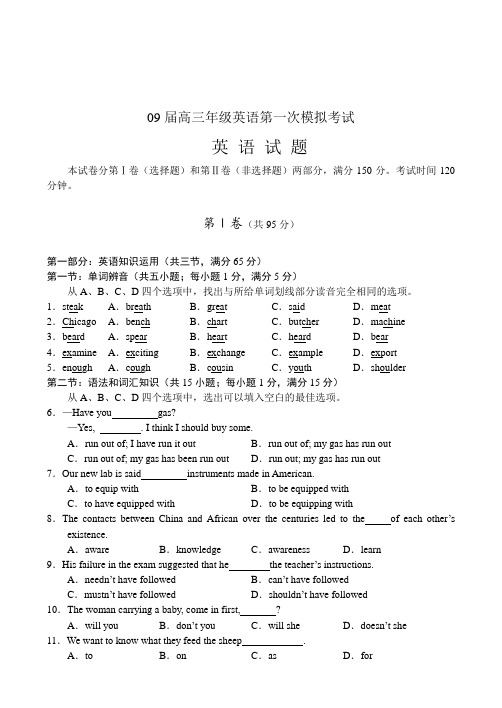
09届高三年级英语第一次模拟考试英语试题本试卷分第Ⅰ卷(选择题)和第Ⅱ卷(非选择题)两部分,满分150分。
考试时间120分钟。
第Ⅰ卷(共95分)第一部分:英语知识运用(共三节,满分65分)第一节:单词辨音(共五小题;每小题1分,满分5分)从A、B、C、D四个选项中,找出与所给单词划线部分读音完全相同的选项。
1.steak A.breath B.great C.said D.meat2.Chicago A.bench B.chart C.butcher D.machine 3.beard A.spear B.heart C.heard D.bear4.examine A.exciting B.exchange C.example D.export 5.enough A.cough B.cousin C.youth D.shoulder第二节:语法和词汇知识(共15小题;每小题1分,满分15分)从A、B、C、D四个选项中,选出可以填入空白的最佳选项。
6.—Have you gas?—Yes, . I think I should buy some.A.run out of; I have run it out B.run out of; my gas has run outC.run out of; my gas has been run out D.run out; my gas has run out7.Our new lab is said instruments made in American.A.to equip with B.to be equipped withC.to have equipped with D.to be equipping with8.The contacts between China and African over the centuries led to the of each other’s existence.A.aware B.knowledge C.awareness D.learn9.His failure in the exam suggested that he the teache r’s instructions.A.needn’t have followed B.can’t have followedC.mustn’t have followed D.shouldn’t have followed10.The woman carrying a baby, come in first, ?A.will you B.don’t you C.will she D.doesn’t she11.We want to know what they feed the sheep .A.to B.on C.as D.for12.It is suggested that a new president for this college.A.appointed B.should be appointedC.is appointed D.has been appointed13.Only three days ago the mistake I’d made the other day.A.did I know B.I knew C.do I know D.I know14.Poor management and leadership widespread trouble in New Orleans in the days after Hurricane Katrina.A.led in B.devoted to C.related to D.contributed to 15.The careless driver is for the traffic accident that yesterday.A.to blame; happened B.to blame; was happening.C.to be blamed; was happened D.to be blamed; happened 16.—Congratulations on winning the first prize in the tennis game!—.A.It’s nothing unusual B.The same as youC.I’m just very lucky D.Success belongs to me17.If Tom carries on working like this, he’ll sooner or laterA.break down B.give out C.get down D.hold on 18.arriving at the spot, the police got down to take photos.A.As; take B.As; taking C.On; take D.On; taking 19.Chicago of 1920s was extremely frightening place.A./; the; the B.The; the; the C.The; the; an D.The; /; an20.This kind of cloth well and long.A.is washed; lasts B.washes; lastsC.washes; is lasted D.is washed; lasted第三节:完形填空(共20小题;每小题1.5分,满分30分)阅读下面短文,掌握其大意,然后从21—40各题所给的四个选项(A、B、C和D)中选出最佳选项。
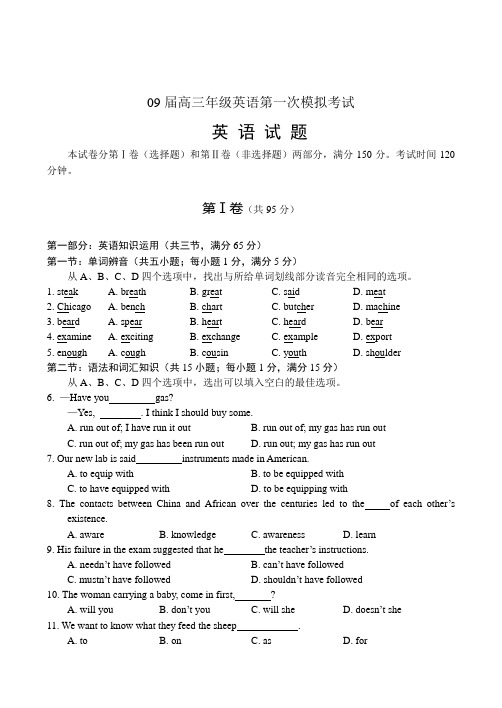
09届高三年级英语第一次模拟考试英语试题本试卷分第Ⅰ卷(选择题)和第Ⅱ卷(非选择题)两部分,满分150分。
考试时间120分钟。
第Ⅰ卷(共95分)第一部分:英语知识运用(共三节,满分65分)第一节:单词辨音(共五小题;每小题1分,满分5分)从A、B、C、D四个选项中,找出与所给单词划线部分读音完全相同的选项。
1. steak A. breath B. great C. said D. meat2. Chicago A. bench B. chart C. butcher D. machine3. beard A. spear B. heart C. heard D. bear4. examine A. exciting B. exchange C. example D. export5. enough A. cough B. cousin C. youth D. shoulder第二节:语法和词汇知识(共15小题;每小题1分,满分15分)从A、B、C、D四个选项中,选出可以填入空白的最佳选项。
6. —Have you gas?—Yes, . I think I should buy some.A. run out of; I have run it outB. run out of; my gas has run outC. run out of; my gas has been run outD. run out; my gas has run out7. Our new lab is said instruments made in American.A. to equip withB. to be equipped withC. to have equipped withD. to be equipping with8. The contacts between China and African over the centuries led to the of each other’sexistence.A. awareB. knowledgeC. awarenessD. learn9. His failure in the exam suggested that he the teache r’s instructions.A. needn’t have followedB. can’t have followedC. mustn’t have followedD. shouldn’t have followed10. The woman carrying a baby, come in first, ?A. will youB. don’t youC. will sheD. doesn’t she11. We want to know what they feed the sheep .A. toB. onC. asD. for12. It is suggested that a new president for this college.A. appointedB. should be appointedC. is appointedD. has been appointed13. Only three days ago the mistake I’d made the other day.A. did I knowB. I knewC. do I knowD. I know14. Poor management and leadership widespread trouble in New Orleans in the days afterHurricane Katrina.A. led inB. devoted toC. related toD. contributed to15. The careless driver is for the traffic accident that yesterday.A. to blame; happenedB. to blame; was happening.C. to be blamed; was happenedD. to be blamed; happened16. —Congratulations on winning the first prize in the tennis game!—.A. It’s nothing unusualB. The same as youC. I’m just very luckyD. Success belongs to me17. If Tom carries on working like this, he’ll sooner or laterA. break downB. give outC. get downD. hold on18. arriving at the spot, the police got down to take photos.A. As; takeB. As; takingC. On; takeD. On; taking19. Chicago of 1920s was extremely frightening place.A. /; the; theB. The; the; theC. The; the; anD. The; /; an20. This kind of cloth well and long.A. is washed; lastsB. washes; lastsC. washes; is lastedD. is washed; lasted第三节:完形填空(共20小题;每小题1.5分,满分30分)阅读下面短文,掌握其大意,然后从21—40各题所给的四个选项(A、B、C和D)中选出最佳选项。
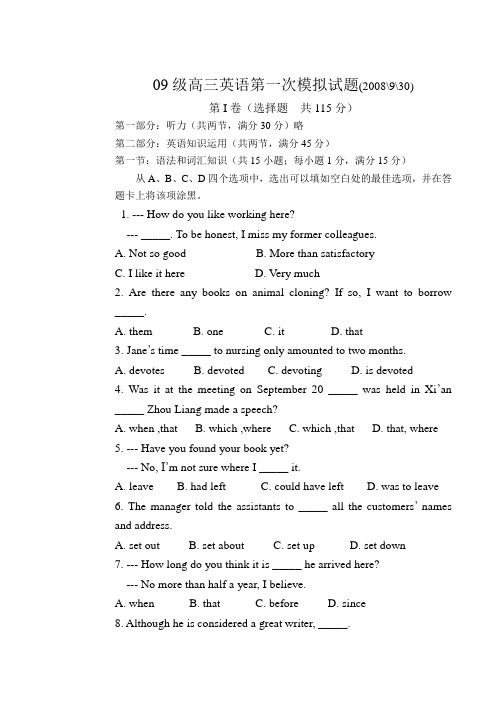
09级高三英语第一次模拟试题(2008\9\30)第I卷(选择题共115分)第一部分:听力(共两节,满分30分)略第二部分:英语知识运用(共两节,满分45分)第一节:语法和词汇知识(共15小题;每小题1分,满分15分)从A、B、C、D四个选项中,选出可以填如空白处的最佳选项,并在答题卡上将该项涂黑。
1. --- How do you like working here?--- _____. To be honest, I miss my former colleagues.A. Not so goodB. More than satisfactoryC. I like it hereD. Very much2. Are there any books on animal cloning? If so, I want to borrow _____.A. themB. oneC. itD. that3. Jane’s time _____ to nursing only amounted to two months.A. devotesB. devotedC. devotingD. is devoted4. Was it at the meeting on September 20 _____ was held in Xi’an _____ Zhou Liang made a speech?A. when ,thatB. which ,whereC. which ,thatD. that, where5. --- Have you found your book yet?--- No, I’m not sure where I _____ it.A. leaveB. had leftC. could have leftD. was to leave6. The manager told the assistants to _____ all the customers’names and address.A. set outB. set aboutC. set upD. set down7. --- How long do you think it is _____ he arrived here?--- No more than half a year, I believe.A. whenB. thatC. beforeD. since8. Although he is considered a great writer, _____.A. his works are widely readB. but his works are not widely readC. however his works are not widely readD. yet his works are not widely read9. _____ the temperature falling so rapidly, we couldn’t go on with the experiment.A. SinceB. despiteC. WithD. As10. He suggested the problem worth paying attention _____ at the meeting.A. to be discussedB. to discussingC. to discussD. to being discussed11. Our vacation was totally ruined. Not only was the food terrible, the weather was awful _____.A. thoughB. as wellC. eitherD. however12. His speech was so confusing that I could hardly make any _____ of it.A. meaningB. understandingC. senseD. explanation13. Shanghai is a _____ city in China, _____ everyone knows.A. high developed, whichB. highly developed, whatC. high developing, whichD. highly developing, as14. Generally speaking, ____ according to the directions, the drug has no side effect.A. when takingB. when takenC. when to takeD. when to be taken15. _____ , he ate nothing.A. Hungry though he isB. As he was hungryC. Hungry as he wasD. Though he is hungry第二节:完形填空(共20小题;每小题1、5分,满分30分)阅读下面短文,从短文后所给各题的四个选项A、B、C、D中,选出可以填入空白处的最佳选项,并在答题卡上将该项涂黑。
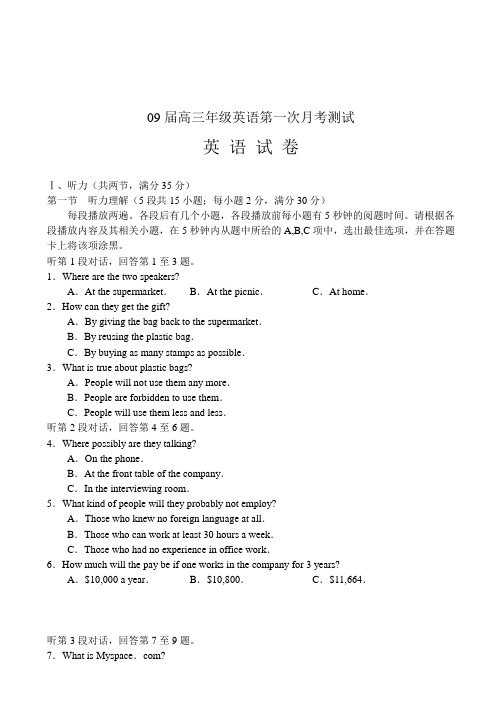
09届高三年级英语第一次月考测试英语试卷Ⅰ、听力(共两节,满分35分)第一节听力理解(5段共15小题;每小题2分,满分30分)每段播放两遍。
各段后有几个小题,各段播放前每小题有5秒钟的阅题时间。
请根据各段播放内容及其相关小题,在5秒钟内从题中所给的A,B,C项中,选出最佳选项,并在答题卡上将该项涂黑。
听第1段对话,回答第1至3题。
1.Where are the two speakers?A.At the supermarket.B.At the picnic.C.At home.2.How can they get the gift?A.By giving the bag back to the supermarket.B.By reusing the plastic bag.C.By buying as many stamps as possible.3.What is true about plastic bags?A.People will not use them any more.B.People are forbidden to use them.C.People will use them less and less.听第2段对话,回答第4至6题。
4.Where possibly are they talking?A.On the phone.B.At the front table of the company.C.In the interviewing room.5.What kind of people will they probably not employ?A.Those who knew no foreign language at all.B.Those who can work at least 30 hours a week.C.Those who had no experience in office work.6.How much will the pay be if one works in the company for 3 years?A.$10,000 a year.B.$10,800.C.$11,664.听第3段对话,回答第7至9题。
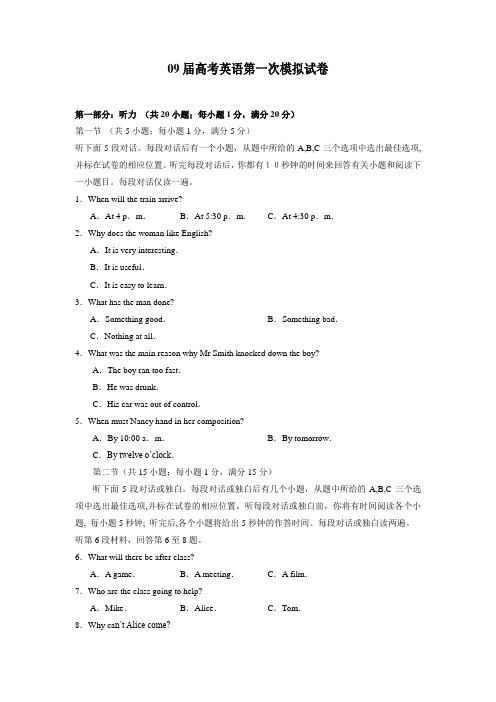
09届高考英语第一次模拟试卷第一部分:听力(共20小题;每小题1分,满分20分)第一节(共5小题;每小题1分,满分5分)听下面5段对话。
每段对话后有一个小题,从题中所给的A,B,C三个选项中选出最佳选项,并标在试卷的相应位置。
听完每段对话后,你都有10秒钟的时间来回答有关小题和阅读下一小题目。
每段对话仅读一遍。
1.When will the train arrive?A.At 4 p.m.B.At 5:30 p.m.C.At 4:30 p.m.2.Why does the woman like English?A.It is very interesting.B.It is useful.C.It is easy to learn.3.What has the man done?A.Something good.B.Something bad.C.Nothing at all.4.What was the main reason why Mr Smith knocked down the boy?A.The boy ran too fast.B.He was drunk.C.His car was out of control.5.When must Nancy hand in her composition?A.By 10:00 a.m.B.By tomorrow.C.By twelve o’clock.第二节(共15小题;每小题1分,满分15分)听下面5段对话或独白。
每段对话或独白后有几个小题,从题中所给的A,B,C三个选项中选出最佳选项,并标在试卷的相应位置。
听每段对话或独白前,你将有时间阅读各个小题, 每小题5秒钟; 听完后,各个小题将给出5秒钟的作答时间。
每段对话或独白读两遍。
听第6段材料,回答第6至8题。
6.What will there be after class?A.A game.B.A meeting.C.A film.7.Who are the class going to help?A.Mike.B.Alice.C.Tom.8.Why ca n’t Alice come?A.She has to visit Tom.B.She has to do her homework.C.She has to look after her mother at home.听第7段材料,回答第9至11题。
09届高三年级英语第一次阶段测试英语试题2008.8(卷面分值120分;考试时间120分钟)第I卷(共三部分,共85分)第一部分听力(共两节,满分20分)第一节(共5小题;每小题1分,满分5分)听下面5段对话。
每段对话后有一个小题,从题中所给的A、B、C三个选项中选出最佳答案。
听完每段对话后,你都有10秒钟的时间来回答有关小题和阅读下一个小题。
每段对话仅读一遍。
1. Who is coming for tea?A. JohnB. Mark.C. Tracy.2. What will the man do next?A. Leave right away.B. Stay for dinner.C. Catch a train.3. What does the man come for?A. A lecture.B. A meeting.C. A party.4. What size does the man want?A. 9.B. 35.C. 39.5. What are the speakers talking about?A. Life in Southeast Asia.B. Weather condition.C. A holiday tour.第二节(共15小题;每小题1分,满分15分)听下面5段对话或独白。
每段对话或独白后有几个小题,从题中所给的A、B、C三个选项中选出最佳选项,并标在试卷的相应位置。
听每段对话或独白前,你将有时间阅读各个小题,每小题5秒钟;听完后,各小题将给出5秒钟的作答时间。
每段对话或独白读两遍。
听第6段材料,回答第6至7题。
6. What is the man doing?A. Giving a speech.B. Chairing a meeting.C. Introducing a person.7. Why does the woman sing so well?A. She has a great teacher.B. She teaches singing.C. She is young.听第7段材料,回答第8至9题。
8. What is the second gift for Jimmy?a. A car. B. A watch. C. A computer.9. Why does Jimmy feel happy?A. He lives with his parents.B. He’s got what he dreamt of.C. He’s received lots of presents.听第8段材料,回答第10至12题。
10. What is the relationship between the speakers?A. They are friends.B. They are strangers to each other.C. They are husband and wife.11. Why does the woman come to talk with the man?A. To get a job.B. To take a test.C. To see the secretary.12. What does the man mean by saying sorry?A. He can’t hear the woman clearly.B. He doesn’t need a designer.C. He can’t help the woman.听第9段材料,回答第13至16题。
13. What do we know about the woman?A. She lives close to the office.B. She is new to the company.C. She likes the big kitchen.14. How does the man go to work?A. On foot.B. By bus.C. By car.15. Why was Susan late for work?A. She missed the bus.B. Her train was late.C. Her car broke down.16. What will the man do the next day?A. Go to work by train.B. Visit Lily in her flat.C. Leave home earlier.听第10段材料,回答第17至20题。
17. Where can you most probably hear this talk?A. In a class of the English language.B. In a class of the Greek language.C. In a class of the French language.18. How long does the class last?A. 11 weeks.B. 13 weeks.C. 15 weeks.19. What is “the short-cut” to learning words according to the speaker?A. Taking more courses.B. Reading basic words aloud.C. Learning how words are formed.20. Why is the class popular?A. It is not offered each term.B. It’s taught by Professor Morris.C. It helps to master some useful rules.第二部分英语知识运用(共两节,满分35分)第一节单项填空(共15小题;每小题1分,满分15分)从A、B、C、D四个选项中,选出可以填入空白处的最佳答案。
21. ---Shall I give you a hand with this as you are so busy now?---Thank you. ______.A. It couldn’t be betterB. Of course you canC. If you likeD. It’s up to you22. The birds, ______ by the presence of the scientists, disappeared really quickly again.A. frightenedB. being frightenedC. have been frightenedD. were frightened23. Steve was wearing a red silk shirt that didn’t ______ him at all.A. serveB. meetC. satisfyD. suit24. There’s no doubt ______ the famous professor will come to give us a lecture.A. ifB. thatC. whatD. whether25. It was too hard for the firefighters to get close to the burning building. All their attempts torescue the people trapped were ______.A. in placeB. in returnC. in vainD. in danger26. Standing on the sideway, I saw off my father and a minute later he ______ in the crowd.A. had swallowedB. was swallowed upC. swallowed upD. swallowed27. ---He didn’t feel a bit nervous when ______.---No. He’d spent a lot of time ______ for it after all.A. interviewing; to prepareB. interviewed; to prepareC. interviewing; preparingD. interviewed; preparing28. We had been told that under no circumstances ______ the telephone in the office for personalaffairs.A. may we useB. we may useC. we could useD. did we use29. Dad ______ whisky, but normally only drank in the evening when work was done.A. was tired ofB. was fond ofC. was familiar withD. was afraid of30. ---I have ______ to apologize for the slight damage to your recorder.---Never mind.A. after allB. in the first placeC. at firstD. as usual31. Our ______ resources and stable policy provide foreigners with the advantages ofdeveloping their businesses.A. generousB. limitedC. narrowD. abundant32. ---Sunny day, isn’t it?---Let’s hope the sunny weather ______ for Saturday’s tennis match.A. carries onB. breaks upC. keeps upD. gets on33. Everybody present at the meeting agreed to stick to the ______ that everyone should betreated fairly.A. purposeB. ambitionC. principleD. level34. Before liberation there were many areas in China where poor people were dressed ______rags and could not make their ends meet.A. inB. onC. withD. off35. It is possible to make good movies cheaply. ______, “low-budget”doesn’t have to mean“bad”.A. HoweverB. FurtherC. ThoughD. But第二节完形填空(共20小题;每小题1分,满分20分)阅读下面短文,掌握其大意,然后从36-55各题所给的四个选项(A、B、C和D)中,选出最佳选项。